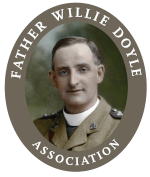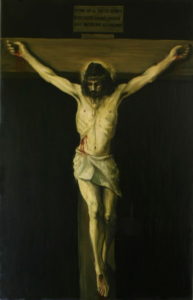Today we consider one of the first exercises from the first week of the Spiritual Exercises – the meditation on sin.
The first week of the Spiritual Exercises is tough – it includes meditations on sin, death, judgement, hell and so forth. Later on the Exercises consider the Resurrection and happier subjects for meditation. But the purpose of the first week is to purify the soul.
Here is the text of the Exercises dealing with the sin, followed by Fr Doyle’s notes on this meditation.
Second Prelude. The second is to ask God our Lord for what I want and desire.
Here it will be to ask shame and confusion at myself, seeing how many have been damned for only one mortal sin, and how many times I deserved to be condemned forever for my so many sins.
First Point. The first Point will be to bring the memory on the First Sin, which was that of the Angels, and then to bring the intellect on the same, discussing it; then the will, wanting to recall and understand all this in order to make me more ashamed and confound me more, bringing into comparison with the one sin of the Angels my so many sins, and reflecting, while they for one sin were cast into Hell, how often I have deserved it for so many.
I say to bring to memory the sin of the Angels, how they, being created in grace, not wanting to help themselves with their liberty to reverence and obey their Creator and Lord, coming to pride, were changed from grace to malice, and hurled from Heaven to Hell; and so then to discuss more in detail with the intellect: and then to move the feelings more with the will.
Second Point. The second is to do the same–that is, to bring the Three Powers–on the sin of Adam and Eve, bringing to memory how on account of that sin they did penance for so long a time, and how much corruption came on the human race, so many people going the way to Hell.
I say to bring to memory the Second Sin, that of our First Parents; how after Adam was created in the field of Damascus and placed in the Terrestrial Paradise, and Eve was created from his rib, being forbidden to eat of the Tree of Knowledge, they ate and so sinned, and afterwards clothed in tunics of skins and cast from Paradise, they lived, all their life, without the original justice which they had lost, and in many labors and much penance. And then to discuss with the understanding more in detail; and to use the will as has been said.
Third Point. The third is likewise to do the same on the Third particular Sin of any one who for one mortal sin is gone to Hell–and many others without number, for fewer sins than I have committed.
I say to do the same on the Third particular Sin, bringing to memory the gravity and malice of the sin against one’s Creator and Lord; to discuss with the understanding how in sinning and acting against the Infinite Goodness, he has been justly condemned forever; and to finish with the will as has been said.
Colloquy. Imagining Christ our Lord present and placed on the Cross, let me make a Colloquy, how from Creator He is come to making Himself man, and from life eternal is come to temporal death, and so to die for my sins.
Likewise, looking at myself, what I have done for Christ, what I am doing for Christ, what I ought to do for Christ.
And so, seeing Him such, and so nailed on the Cross, to go over that which will present itself.
The Colloquy is made, properly speaking, as one friend speaks to another, or as a servant to his master; now asking some grace, now blaming oneself for some misdeed, now communicating one’s affairs, and asking advice in them.
St Ignatius presents three images – the sin of the fallen angels who rebelled against God, the sin of our first parents and the sin of a person who committed only one mortal sin in their life, and went to Hell because this was not repented.
This meditation should fill us with great gratitude for the mercy of God who has given us every opportunity to repent.
Here are Fr Doyle’s thoughts:
I can say with all truth that only for the great mercy of God I should now have been in hell. I deserved it for my years of tepidity in Clongowes. Never did the good God show His goodness to me more than in saving me from grievous sin. I have here a second motive of gratitude to urge me to do all He wants.
The meditation on the barren fig-tree (5. Luke 13.) recalled to my mind this gospel which I read in the Mass at Paray- le-Monial. For sixteen years has Jesus been seeking fruit from my soul, and especially in these last three years of preparation for the priesthood. I have no excuse for He has told me how to produce that fruit, especially by the exact discharge of each little duty of the moment. “Spare it for this year,” Never shall I have this opportunity again of becoming holy; and if now I do not “dig round” this unfruitful tree so that it bear much fruit, Jesus will surely “cut it down” by withdrawing His graces and loving invitations.
Truly I have ever been in the community “a running sore” of harm and evil example. My Jesus, can I ever make amends for all the harm I have done? Help me from this instant to try and do so by my fervent earnest life. Help me to become thoroughly changed and to do all You want of me.
This thought came to me. If Jesus wants me to go to the Congo, I shall do more for souls there than by remaining at home. Besides, my sacrifice will obtain grace for others to do more good than I ever could.
“Because you have sinned, cursed be the earth in your work.” (Genesis 3. 17.) I see here the reason why my work for souls must be unfruitful God will never bless it while I have an affection for sin or lead a careless life.
COMMENT: Fr Doyle refers to Clongowes; this is a Jesuit school in Ireland where he worked for a while as a Jesuit seminarian. He felt that he was tepid while he worked there, although his colleagues at the time considered him an exemplary Jesuit. Perhaps he felt he had been tepid compared with the ardent love and desire for holiness that he felt in his soul. Perhaps his tepidity was relative in nature; even a very devout Jesuit could be tepid relative to the incredible holiness Fr Doyle pursued, and exhibited, in the remaining 10 years of his life.
Interestingly, Fr Doyle felt great gratitude that he was preserved from grievous sin. St Therese also felt this gratitude, and once commented that it is not the great sinner who has been forgiven that has the greatest motive for thanks, but the one who has been protected from sin, for this grace is a pure gift from God that our own meagre efforts are not capable of.
Finally, we may all gain from Fr Doyle’s reflection on the fruitlessness of our work if we live in sin and lukewarmness.

